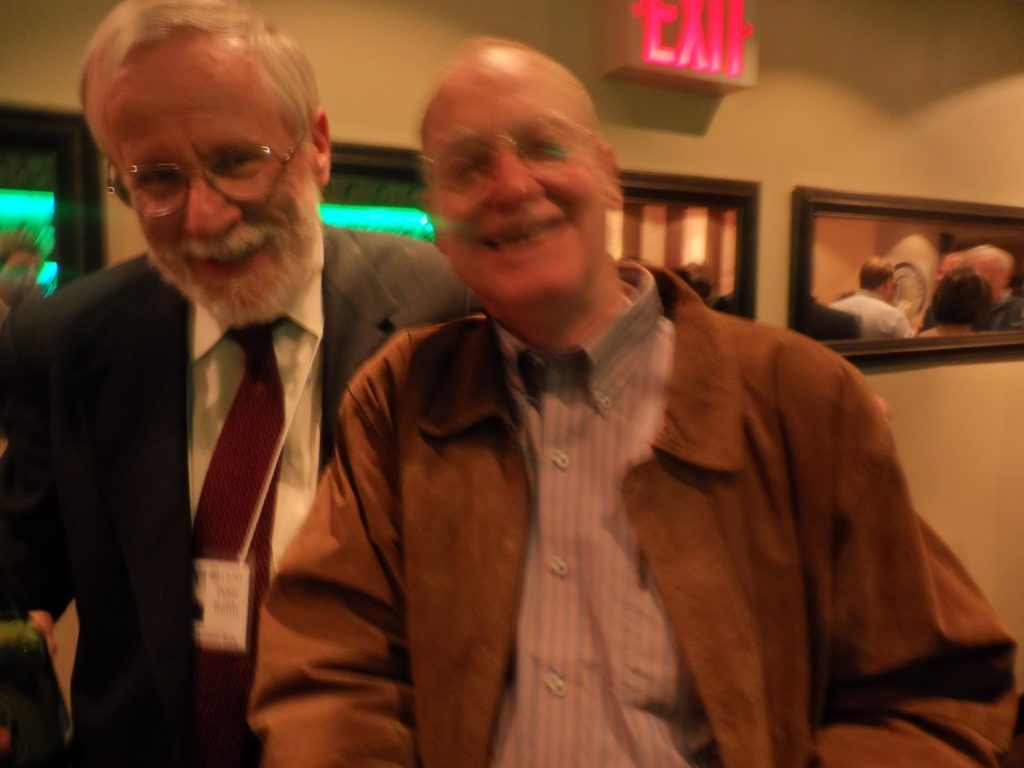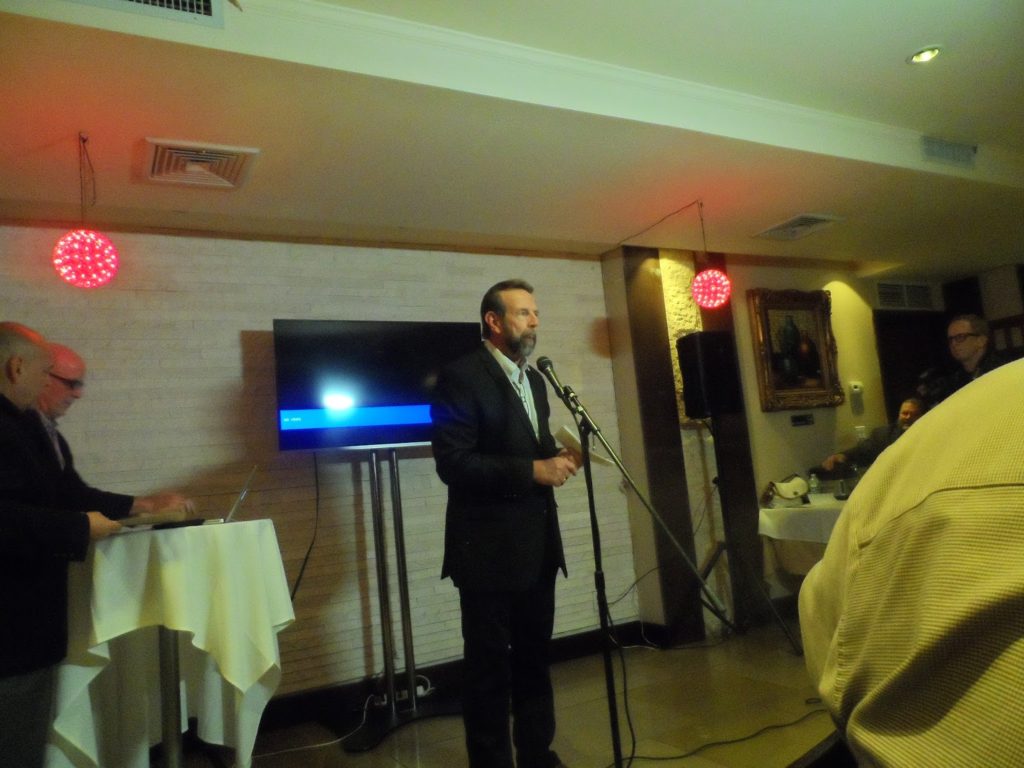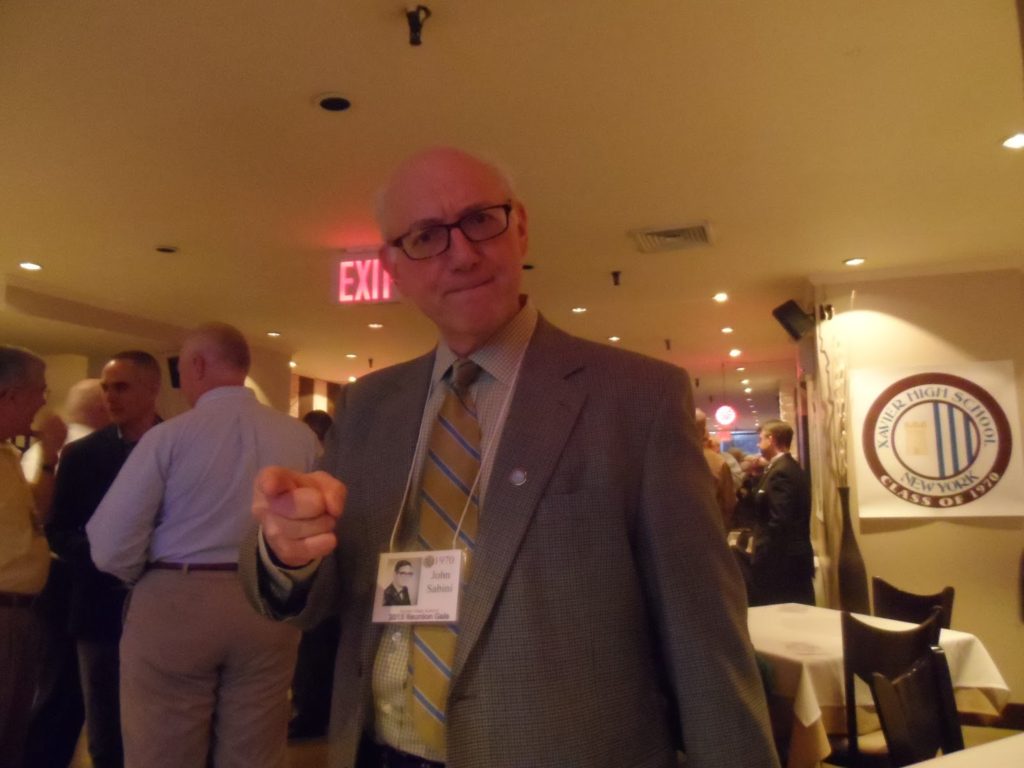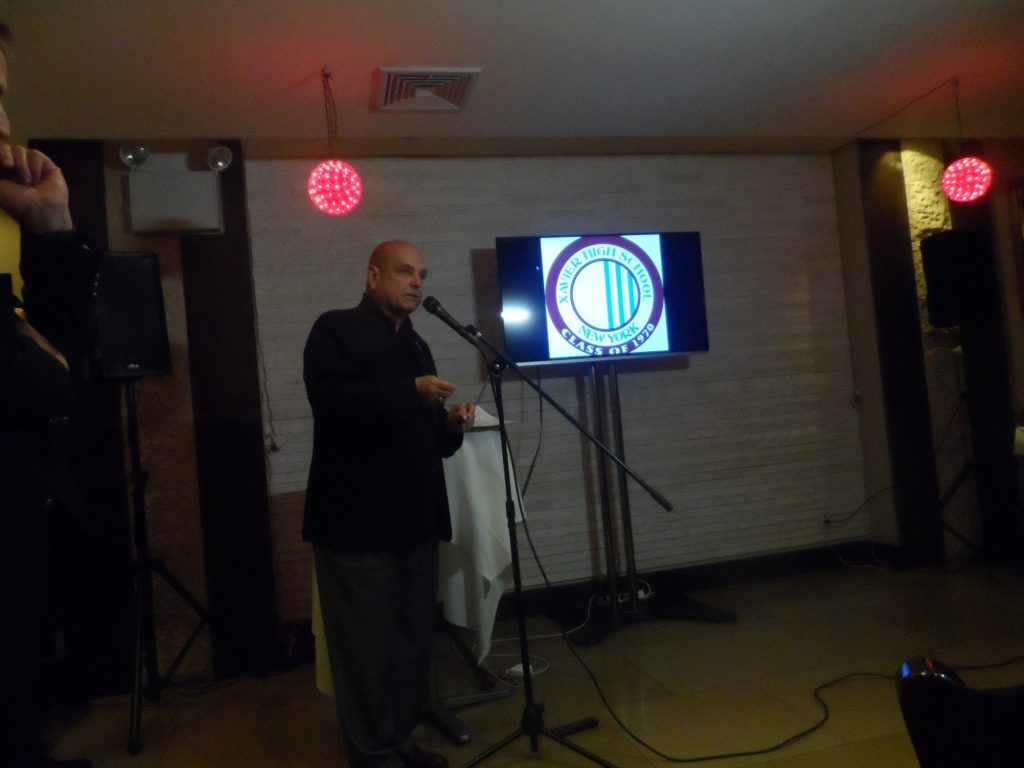Whatever Regimental glory I won when I graduated in 1953 is unrecorded. The one item I can point to is that I rose to the rank of Lt. Colonel, commanding officer of the Marching Band. I count that an honor because traditionally the post had been held by a Major.
Supreme Court Justice Antonin Scalia speech to Xavier High School JROTC Regiment May 17, 2011
Linear Narrative Suspended
This is the second installment that treats the peculiar phenomenon of cadet rank. I will take up the growing anti-war sentiment in the next and possibly final installment.
My Crowd
In part III, I focused on my own reference group. There was the Unclique (a recently coined term by the way) of Jean Shepherd fanatics, the Gang of Five- the elite of the Classics Honors program who took both AP Latin and AP English as juniors, McGowan’s Maggots – The Regimental Supply Corps. I only alluded to it but there was also the Chess Team. Those were my people.
And they were marvels of military mediocrity. None of them were like my friend science fiction author John Sundman who graduated as a corporal and was displeased with himself, because he did not achieve his brother’s feat of going four years without earning a single stripe.
In the great rank sweepstakes at the beginning of Senior year where well over half the seniors were assigned the leadership positions beyond squad leader in the Regiment – from platoon sergeant to the colonel, we all took away one of the prizes, but none of us hit one of the jackpots that would put diamonds on our shoulders.
The enlisted ranks were very similar to the real Army with chevrons and rockers, call them stripes, from 1 for PFC to 6 for master sergeant with a diamond nestled in there for First Sergeant and a star for Sergeant Major.
Cadet officer rank was signified by small circles – pips – or diamonds. 1 to 3 pips for second lieutenant to captain and diamond shaped insignia – one for majors, two for lieutenant colonel and three for the colonel.
My primary reference group the Unclique and the Gang of Five were all pips and stripes. My friend Bruce Strzelczyk from the Chess team achieved some distinction as commander of the MP platoon. MP duty had previously been a random extra assignment of juniors, who could persecute freshmen, and seniors who could persecute sophomores. The new MP platoon got a special marker crossed pistols rather than crossed rifles for their brass, just like real MPs in the real Army. Membership was restricted to juniors and seniors.
There was a flaw in the concept, though. The only seniors Bruce could draw from were part of the less than half the class that had not scored any reserved for seniors postion in the Regiment. I remember being amused to see on of the MPs patrolling the lunch room was a kid who had once had indefintie Jug.
And of course, one of the Supply Corps seniors, Paul Fuller, became commander of the Supply Corps, which made him a regimental staff officer, one of the colonel’s twelve apostles, but it was a given that one of McGowan’s maggots would get that prize.
What Was The Secret of Their Success?
I who had lusted after a Sam Browne and saber and gold trim on my hat had a binary view of the matter. There were officers and there were not officers, but then I got a different view when I reconnected with my friend Jerry Snee, the founder of Squidget
Jerry was a year behind me at Xavier. His class was the last to have four years of mandatory military participation. At the same time that I had arranged to be part of the small group of students that the school song notwithstanding did not “keep marching”, Jerry saw Lou Saco being dubbed Colonel of the Class of 1968 and determined that he would be in that position three years hence and worked tirelessly to achieve that goal. It takes all kinds I guess.
Fighting The Tide
I was under the impression, probably accurate, that becoming a cadet officer was much like the regular promotions – good grades and not getting in trouble with some nod to military merit – which in my mind was tied up with shoe shining, brass polishing and head shaving. In theory hair was supposed to be a pass fail inspection issue, but the really mil guys did not buy that. I think that the scorn that stellar students might experience in public schools ended up being directed toward the zealously military.
Regardless, Major Smullen seemed determined to place more emphasis on military merit instituting an OCS process for prospective cadet officers.
The apparent delay in the selection of cadet officers and the fallout from it seems to have been a result of tension between the Jesuits and the military. As noted I am ignoring the big picture for now, but I did learn that the tension was intense from a source who would know.
A Distinguished Career
At the 20th and 45th reunions I chatted up a classmate Scott O’Connnel who I had not known that well at Xavier. He was a career Army officer – tanks and intelligence. He now writes spy novels about the American Revolution and even appeared here with a guest post. He told me about how things had turned out for Major Smullen.
Our Major Smullen had a distinguished career retiring as a full Colonel along with his four star general boss Colin Powell to help Powell with his memoirs. He describes that phase as “two old soldiers trying to sell a book”. He also worked for Powell when he was Secretary of State. Now as “Bill Smullen”, he is Director of National Security Studies at Syracuse University
I reviewed his book Ways And Means For Managing Up and highly recommend it.
Some Inside Information
Anyway, I corresponded with him a bit. Ways And Means For Managing Up has many anecdotes from his career but none from Xavier. He clued me in a bit on the cadet officer selection. Apparently it was mainly between him and Father Heavey, the Prefect of Discipline, with the list to be approved by the headmaster. I mentioned that Father Heavey terrified many of us and he responded
It was his job and you were supposed to be terrified which made HIS job easier.
Major Smullen got on famously with Father Heavey. They were buds. When it came to Father Duminico, the headmaster, Major Smullen had a much harder time. He saw Father Duminico as wanting to eliminate the military as inconsistent with Jesuit values. So it may well be that the officer announcements were delayed as negotiations went on between factions of the Jesuits supported by the headmaster and the more militant in line with the Prefect and the Senior Army Instructor.
I kind of understand the logic of having it be Major Smullen and Father Heavey selecting the cadet officers, but there is an amusing note to it. The seniors that spent the most time with Father Heavey feeling the full blast of discipline, standing at attention in front of his office for days or getting tuned up in the office were not the most likely to be cadet officers. Actually their chance of being graduates was not on the high side.
It seems though that having Father Heavey know who you were did not necessarily mean trouble. It could also mean that you were on the road to eminence. That is certainly what Jerry Snee, who made a study of these things in his quest for the colonelcy thought. He became one of the Junior Provost Marshalls who were much more implicated in maintaining the reign of terror that passed for discipline than were the likes of me who was drafted into service as an MP.
I did not graph the rank structure of the Regiment, but it has to be somewhat close to a bell curve with my crowd that went from Master Sergeant to Captain within one standard deviation of the mean. Staying off Father Heavey’s radar was a rational survival strategy that we all practiced. Apparently those well know to Father Heavey were both tails of the curve. Not only the 17 members of the Privates Club, but also the Colonel and his twelve apostles.
Of course it is also likely that Father Heavey channeled the feedback of the other Jesuits into his part of the list making as Major Smullen would get input from the Sergeants, as he had not yet had any of us in class. We had been learning marksmanship and squad tactics and weapons, not the heady stuff that Major Smullen taught the seniors.
I told Bill Smullen that it was rather amazing how hard kids took being disappointed with the ranks they achieved. I even heard a story about somebody who needed therapy as a result. Bill would not take the bait, though and I may have exhausted his patience with the topic.
I don’t do office politics so choose not to comment on who was in and who was not. Assuming everyone survived even with therapy it is better than the alternative.
Misplaced Sympathy
I mentioned how Father Dineen, a kindly young priest who was a counselor showed up as a benign figure as the freshmen were being shaped to be part of the Regiment. He accosted me in the hall after the great announcement and told me that he was upset that I had not become one of the officers and that he, in conjunction with other faculty, was presenting a list of meritorious seniors who had been left behind.
Father Dineen who probably never got down to the basement or been in the Arms Room had no appreciation for what a glorious thing it was to be First Sergeant of the Supply Corps and probably thought I was as butt hurt as other seniors who were disappointed with their position in the regiment. Some of them were officers. I have this vague memory of one senior who was very disgruntled who had a diamond on his collar, a major, one of the twelve apostles. Go figure.
Captain Xavier
The only student who ranked high as a junior who relished his lack of advancement in the grand rank sweepstakes at the beginning of Senior Year more than I did was Tom Piwinski. Tom was something of a prankster and we took to calling him Captain Xavier. He may have been the one responsible for convincing Sergeant McMillen that there was an extra kid in his class who never showed up.
Tom was a good student who did not get in much trouble, so like 80% of my Gang of Five, he was Sergeant First Class at the end of junior year. When slightly more than half the class was assigned positions call for rank of SFC or above, Tom got nothing.
He would be routinely promoted in December making him Master Sergeant. His position was “Squad Member” – same as all the freshmen and most of the other underclassmen and the members of the Privates Clubs whose military function was to be a bad influence on the freshmen who stood with them in the ranks.
The story I heard was that Tom’s platoon leader did not want a Master Sergeant standing in the ranks. So Captain Xavier got himself a clipboard and would walk around at drill doing “Master Sergeant stuff”. I have not confirmed this story, but if it is not true, it deserves to be.
Unraveling The Mystery Of High Rank
As Jerry Snee and I sat in the Gold Star Diner in Worcester last year and he related to me his quest for the colonelcy, I became fascinated that this was a thing. He had a better handle on what had gone on with my class as he naturally made a study of them. His uncle was a Jesuit so he had a lot of other insight.
I might have dismissed this as one of those odd adolescent ambitions. Like wanting to be first board of the Chess Team or get my USCF(United States Chess Federation) rating over 1200 or actually win a game against a kid who was Jewish, but then I attended our 45th reunion last May.
The Reunion
I had been pretty regular about attending the five year reunions for the first quarter century. Enough so that I can recall more than once dropping Father Vinny Euk off in his parish in the Bronx as I drove back to Massachusetts. Back in the day, I had enough stamina to drive 200 miles down to New York and 200 miles back in the same day. Unaccountably, I skipped 30, 35 and 40.
The big incentive to going to 45 was that I could stay with my son in Brooklyn. It took me a couple of rides to get used to the subway again (They have this confusing card system, rather than the good old subway tokens), but it is more all those people.
There were two events one on Friday and the other on Saturday. It is only the Friday night event that is relevant. It was a get together at a bar restaurant for the Class of 1970 only.
One of the things that struck was how many people were there that I did not know at all. I was pleased that John Sabini made it, despite the fact that he has developed a disturbing resemblance to Larry David.
I was also delighted that Mr. Moroney who taught English to the Classic Honors Sophomores and the AP English Seniors made it.
 |
| If there is any good writing here, thank the guy on your right |
At any rate there were some presentations including something on the over twenty members of the class who have graduated to the next level.
The coldly analytical part of me could not resist checking the standard mortality tables used for IRS actuarial computations when I got back home. As it turns out the class isn’t doing so bad mortality wise.
What was very interesting though was another presentation, Called up to speak to us was our Colonel, who has the somewhat improbable name of Charlie Brown.
 |
| Charlie Brown – Cadet Colonel Class of 1970 |
The reaction, which I totally shared, was rather extraordinary as we all cheered and broke into a rousing rendition of the school song. Goddamn it, Old Charlie Brown was the best colonel in the history of Xavier. I mean Lou Saco might have been OK, but he was no Charlie Brown. Fuck you Class of 1968.
Bob Calcagno also rose. Now Bob was the chair or whatever of whatever the thing was that we had instead of a Student Council (You see what an impression it made), but I think there was more of an emphasis on the fact that he had been the Regimental Sergeant Major. I swear if I blinked I would see the Sam Browne.
Holy shit! Sixty fucking three years old and there I am cheering with the rest of the elderly “kids” for our Colonel. What was this all about?
The In Crowd?
The term I recently coined of the Unclique has its orgin in a remark that Mike Oleske made back then that people were talking about cliques and he thought he was in the group of people who weren’t part of a clique.
I think in a coed high school, there is much more in the way of status hierarchy since the girls will judge the boys by some criteria – athletics maybe – and the boys will judge the girls, by, well you know. If there is one unpropular idea I have as a result of my education and upbringing it is that single sex high schools are a fantastic idea. It is even better for the girls from what I have been able to gather over the years.
It seems rather odd that given that we were wearing uniforms with rank insignia, that we were less status conscirous in our relationships with one another. But it was true. Well in a sense. But there were three incidents in my senior year that made me rethink that just a bit.
Maybe Learning Where I Fit In
I have to give an important preface to the three stories. I have told them to people and their reaction has been that I am somehow telling a tale of adolescent angst and they respond compassionately concerned that I was hurt. That is not my goal in telling these tales. In these tales my role is something of an amateur anthropolgist in the participant observer mode documenting the ways of my own tribe. Frankly, I don’t think my feelings were hurt even then, but if they were it passed quickly unlike other things that still haunt me. So here are the three incidents.
PAX Is Not Open At Least To Me
During Junior year one of the big event was a spiritual retreat at Gonzaga Retreat House. I think we went by homeroom although there may have been more than one there. My memories of it are a bit vague, but that is neither here nor there.
At the retreat, probably a different one from mine, a few kids were somehow inspired to form a group to make Xavier a better place. It was called PAX (which you and I both know means peace in Latin, but I’m mentioning that for somebody who might stumble in here without our training). Remember this is 1969, there were still 475,000 American troops in Vietnam – down from the 536,100 in 1968 – but still a lot. So peace was on everybody’s mind. The acronym stood for Positive Action for Xavier and they would be coming up with all sorts of ideas to make Xavier better.
It really seemed to have caught on by way of influence. They probably had somebody on the school paper or something. Not long into Senior year, but after the great rank sweepstakes, I felt moved to inquire about becoming part of PAX. I do have the tendency to be drawn to things like that.
I was told by the person I inquired of that it was a tightly knit closed group that was not seeking nor could it accomodate new members. I noted that the person I inquired of was one of the twelve apostles and I also noted that there seemed to be more than a couple of high rankers in PAX.
The first evidence of there possibly being an in-group.
What Is He Doing Up There?
I have always done well on standardized tests. Just to get into Xavier you needed to pretty well on the Diocesan Exam, but probably not extremely well, because then you would have gotten into Regis when you took their test. I don’t know, maybe Regis was just a bad day. I do recall it as the hardest test I ever took.
Regardless, you may be interested in the possible secret of my success. On test days, my mother gave me steak for breakfast. My covivant, who runs a vegetarian household, scorns this observation, but just saying.
Given my gift, for filling in little circles with pencils, which in my generation became very important, it is not that surprising that I was a National Merit Finalist. One of two at Xavier. The other Bob Bennett was also captain of the cross-country team, President of The Class (which was different from Bob Calcagno’s student governance role), a regimental staff officer (i.e. one of the twelve apostles) and, oh yeah, in PAX. Bob was the only member of our class who went to Harvard.
At an assembly, we were both called up to be recognized. I doubt that was the only thing the assembly was about, but still it was a pretty big deal. That was my moment in the 1% (Remember there are over 200 kids in the class).
Afterwards John Sabini told me that whoever was sitting next to him was rather non-plussed that it was me up there. I forget how I was referred to, but it seemed to him entirely inconsistent that some governing body somewhere had determined that at least by their reckoning I was the smartest or second smartest kid in the class. When I related this story to John at the reunion, he, as you might expect, did not recall it and was concerned about my feelings, but as I noted above this is particpant observer amateur anthropology.
Me – Part Of The Establishment – Who Knew?
In Part I, I wrote about my first session of Jug, where I was terrified and utterly thankful that Father Dineen, perhaps noting my distress, sent me on an errand. Well it was about three years before I earned my second and last session of Jug (Well I probably earned more than that, but the transgression went unrecognized).
As best I understand it, Jug was run by two seniors, an officer and a senior NCO. And I beleive it was a random duty, like being an MP had been. For whatever reason, it was something the Supply Corps seniors were exempt from (Running Jug that is. Not serving it.) So I never ran Jug.
Senior year, I was often late, but I only got nabbed once. That’s what I got Jug for.
A curious thing happened when I showed up at the Old Gym to do my time. The in-charges had not showed up yet, so the Seniors among the miscreants on the steps, who were regular enough to count Jug as their primary extra-curricular activity, seeing the six stripes on my epaulettes, assumed I was there to run Jug.
Somebody more clever than I would probably have just dismissed everybody or pulled some prank, but, feeling a bit like Arlo Guthrie, the litterer, I just joined their ranks. I still found it interesting that they kind of thought of me as being an insider.
So What Made The Elite Elite?
I started suspecting that there might be something nefarious about it, that high rank was the way that wealth and influence was smuggled into the school where uniforms and coming by bus and subway pretty well masked our socio-economic status. But then Jerry Snee came through with some great insight. One of the things he did in his colonelcy campaign was help organize the Junior Ring Dance.
It had never crossed my mind that somehow students were in there making things like that happen. Just as it probably never occurred to anybody watching the X-Squad perform at a review how those M-1s had gotten to the right place at the right time.
So my conclusion is that the high ranking officers in the Regiment were somehow those who best embodied the school spirit. It is likely that the apparent struggle over the officer selection may well have reflected what the spirit was to be.
The Colonel Weighs In
Thanks to Facebook, I have connected with more members of my class and even managed an exchange with the inner circle. Charlie Brown is a modest guy and his comments on this subject pretty well confirm my theory. Charlie was one of the numerous members of my class that made his way to Worcester for higher education. We had some difficulty accepting something as being a city when it did not have subways or pizza by the slice, but I certainly came to love it and have lived in the area ever since.
Here is Charle’s take on the selection process.
My understanding is that the decision process for the top ranks was more inclusive. I believe that a number of the Jesuits were at least polled for their suggestions and then were given an opportunity to weigh in as the list got smaller. My opinion always was that to be considered for rank you had to have at least distinguished yourself academically, participate in some school activities, accepted the military as a part of Xavier life and it didn’t hurt to participate in a varsity sport. I was once told that your ability to relate to other students at all levels also was considered. Can’t attest to any of this as fact, no one ever told me why I was chosen and one of 5 or 6 others who in my opinion were better qualified weren’t.
Interesting that you mention Jerry Snee. More than once during his junior year at Xavier and subsequently during our time together at Holy Cross, Jerry brought up his desire to be and then disappointment at not being appointed Colonel.
That comment about Jerry Snee is kind of a spoiler, but we’ll have more on that next time.
Strange as the circumstances were, my memories of Xavier are mostly fond and learning that the selection of the military elite was a benign process makes me kind of happy. It also makes me a little sad about what happened with the military. There was something special about the Regiment and the student body being one. In some ways it reflects what happened with the country as military service has gone from being an expected rite of passage to an unusual vocation.
________________________________________________________________________________
Peter J Reilly CPA has a tax blog on forbes.com to run, so he is hoping that he can get some of his classsmates to weigh in on this series. He has gotten over not having a Sam Browne and saber.


































































































Trackbacks/Pingbacks